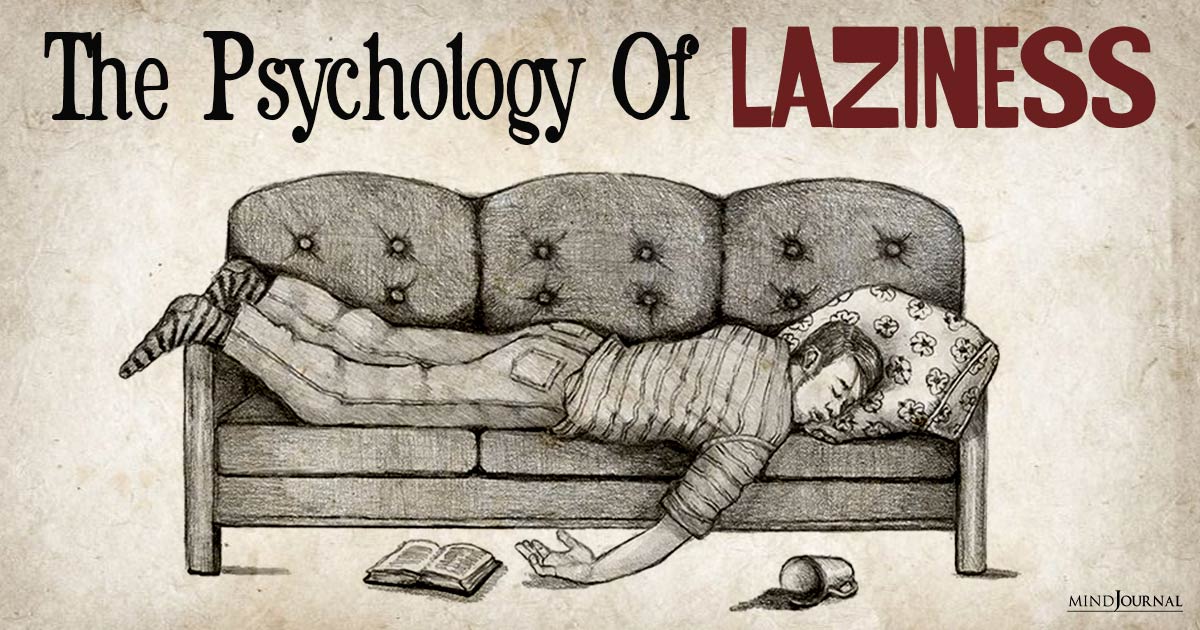Do you ever find yourself struggling to get off the couch, even though you know you have tasks waiting to be completed? Have you ever wondered why it’s so difficult to muster up the motivation to start a project or pursue a passion? Let’s explore the psychology of laziness and what you can do about it.
The Psychology of Laziness: A Complex Human Behavior
Have you ever wondered why some people struggle with laziness and procrastination more than others? Laziness, or the lack of motivation to engage in productive activities, is something that most of us have experienced at some point in our lives.
Laziness is often misunderstood as a character flaw or a sign of incompetence. However, it’s important to recognize that laziness is not solely a matter of willpower or personal choice. It is a complex psychological phenomenon influenced by various factors, including our emotions, habits, and mindset.
Let’s take a deep dive into the psychology of laziness to understand why it occurs, how it affects us, and most importantly, how we can overcome it. So, grab a cup of coffee and let’s explore the fascinating world of laziness together.
Read Kaizen: A Japanese Technique for Overcoming Laziness

What is laziness?
From a psychological perspective, laziness can be understood as a complex phenomenon that involves a lack of motivation and an aversion to engaging in activities that require effort or productivity.
It is important to note that laziness is not simply a matter of being physically tired or seeking relaxation. Instead, it often reflects a psychological state characterized by a resistance to taking action or an inclination towards procrastination.
According to researchers, “Laziness – whether in the sense of an allergy to effort, a morally questionable reluctance to pull your weight when there is work to be done, a fondness for shortcuts, or a well-developed appetite for the pleasures of idleness – has probably always been with us.”
Laziness often involves a lack of motivation, which can arise from various sources, including low self-esteem, depression, or anxiety. Procrastination and avoidance of tasks may be used as coping mechanisms to deal with negative emotions or fear of failure.
Related: Am I Depressed Or Lazy? 4 Things To Know
Additionally, environmental factors such as a lack of structure or reinforcement for productive behavior can contribute to laziness. It’s essential to recognize that laziness is a symptom rather than a standalone trait, and addressing its underlying causes, both psychological and environmental, can be key to overcoming it and fostering a more productive mindset.
Let’s explore the intriguing case of Brian, a young professional, to shed light on the psychology of laziness. By delving into Brian’s experiences, we can gain valuable insights into the underlying factors that contribute to laziness and discover effective strategies to overcome it.
Case Study: Brian’s Struggle with Laziness & Procrastination
Brian is a talented and intelligent individual with ambitious career goals. However, he consistently finds himself falling into the trap of laziness and procrastination, hindering his progress and causing frustration.
Let’s examine the psychological factors that may be influencing Brian’s tendency towards laziness.
1. Fear of Failure and Perfectionism
Brian’s fear of failure manifests as perfectionism, which hinders his motivation and promotes laziness. He sets exceedingly high standards for himself and believes that anything less than perfection is unacceptable.
This fear of making mistakes or falling short paralyzes him, leading him to avoid starting tasks altogether. Consequently, he procrastinates as a way of protecting himself from the potential disappointment or judgment that may come with not meeting his own impossibly high expectations.
2. Instant Gratification
Brian is easily enticed by instant gratification, which reinforces his laziness. He struggles to resist the allure of short-term pleasures, such as social media, video games, or binge-watching TV series.
Engaging in these activities provides immediate enjoyment, while his long-term goals require dedication, effort, and delayed gratification. The temptation of immediate rewards undermines his motivation to engage in more meaningful and productive tasks, perpetuating his cycle of laziness.
3. Overwhelming Tasks and Lack of Clarity
Brian often feels overwhelmed by the magnitude of his goals and the complexity of the tasks needed to achieve them. He struggles to break them down into smaller, actionable steps, making the overall process seem insurmountable.
This lack of clarity exacerbates his laziness, as he does not know where to begin or how to proceed. The overwhelming nature of the tasks leaves him feeling stuck and demotivated, leading him to procrastinate rather than face the perceived challenge.
4. Habitual Patterns
Brian has developed ingrained habits of laziness and procrastination over time. These patterns have become deeply ingrained in his daily routines, making it increasingly difficult for him to break free from them.
The more he indulges in laziness, the stronger these habits become, reinforcing the cycle of inaction. Breaking these habitual patterns requires conscious effort and a commitment to developing new, more productive habits.
5. Environmental and Social Influences
In Brian’s case, environmental and social influences may play a role in his tendency towards laziness. For instance, if Brian’s workspace is cluttered or disorganized, it can negatively impact his focus and motivation.
Distractions in his environment, such as noise or interruptions, can also hinder his ability to stay on task. Additionally, if Brian is surrounded by peers or role models who prioritize leisure over productivity, their behavior and attitudes may influence his own inclination towards laziness.
Related: YOU ARE NOT LAZY!!! 6 Signs You Are Too Depressed To Do Anything
6. Motivation and Reward
Motivation and reward play a significant role in Brian’s struggle with laziness. When Brian perceives a task as lacking clear rewards or as too challenging, his motivation to engage in that task diminishes.
Without a clear sense of the benefits or rewards associated with completing the task, he may struggle to find the drive to initiate action. Additionally, if Brian does not experience a sense of accomplishment or satisfaction from his efforts, his motivation to continue engaging in productive behaviors may decrease, reinforcing his tendency towards laziness.
Identifying and addressing these factors can help Brian develop strategies to overcome his laziness and cultivate a more proactive and productive approach to his goals and responsibilities.
Overcoming Laziness: Practical Strategies
Now that we have delved into the psychology of laziness, let’s explore some practical strategies to overcome it:
1. Cultivating Self-Compassion
Brian can start by practicing self-compassion. By acknowledging that everyone faces setbacks and that perfection is unattainable, he can alleviate the fear of failure.
Embracing self-compassion allows him to view laziness as a temporary obstacle rather than a defining characteristic.
2. Goal Setting and Prioritization
Breaking down Brian’s larger goals into smaller, manageable tasks can provide clarity and alleviate feelings of overwhelm. By setting specific and achievable objectives, he can create a roadmap for his progress.
Prioritizing tasks based on their importance and urgency can also help him focus his efforts more effectively.
3. Time Management Techniques
Brian can benefit from employing time management techniques such as the Pomodoro Technique. This technique involves working in focused bursts of time, typically 25 minutes, followed by a short break.
By utilizing structured intervals, Brian can enhance his productivity and alleviate the sense of monotony that often accompanies prolonged work periods.

4. Building Support and Accountability
Seeking support from friends, family, or mentors can provide Brian with the necessary encouragement and accountability. Sharing his goals and progress with trusted individuals can help him stay motivated and on track.
Additionally, having someone to hold him accountable can push him to overcome his tendency towards laziness.
5. Cultivating a Growth Mindset
Encouraging Brian to adopt a growth mindset is crucial for his long-term transformation. By embracing the belief that abilities and intelligence can be developed through effort and practice, he can view laziness as an opportunity for growth and learning.
This mindset shift can empower him to persevere in the face of challenges and bounce back from setbacks.
Related: Kaizen: A Japanese Technique for Overcoming Laziness
6. Eliminating Distractions
Brian can minimize distractions in his environment to help him stay focused and productive. This may involve turning off notifications on his phone, finding a quiet workspace free from interruptions, or using website blockers to limit access to distracting websites during designated work periods.
7. Tracking Progress and Rewards
Brian can keep track of his progress on tasks and goals. This can be done through a planner, task management app, or a simple checklist. Celebrating milestones and accomplishments along the way, even if they are small, can provide a sense of reward and reinforce his motivation to continue taking action.
Rewarding himself with something enjoyable or meaningful after completing tasks can also serve as an incentive to overcome laziness.
The case of Brian illustrates the complex psychology of laziness and the various factors that contribute to its manifestation. Through an understanding of the fear of failure, instant gratification, overwhelming tasks, and the power of habits, we can develop strategies to overcome laziness and procrastination.
By cultivating self-compassion, setting goals, managing time effectively, seeking support, and adopting a growth mindset, individuals like Brian can break free from the clutches of laziness and unlock their true potential.
Remember, the journey towards productivity and personal growth begins with self-awareness and a commitment to taking action.

Takeaway
The psychology of laziness is a multifaceted phenomenon that affects us all to varying degrees. Understanding the underlying factors that contribute to laziness can empower us to overcome it and lead more productive and fulfilling lives.
Remember, laziness is not a permanent state but a temporary hurdle that can be overcome with self-awareness, determination, and a willingness to take action. So, let’s embrace our potential and embark on a journey of productivity and personal growth.
Related: How To Overcome Laziness and Be Productive: 5 Tips
Frequently Asked Questions (FAQs):
What is the psychological reason for laziness?
Laziness often stems from a lack of motivation, fear of failure, low self-esteem, or environmental factors like a lack of structure.
What is the concept of laziness?
Laziness is a state of disinclination to engage in effortful or productive activities, often due to factors like lack of motivation.
How does laziness affect us?
Laziness can lead to missed opportunities, reduced productivity, increased stress, and hindered personal and professional growth and fulfillment.










Leave a Reply